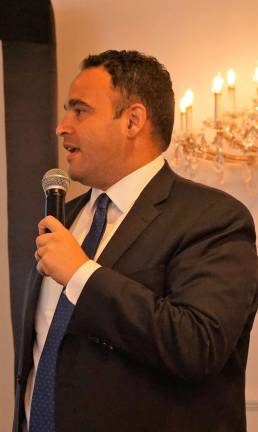Speaker tackles legalized marijuana

STANHOPE — “Is marijuana the new big tobacco?” asked Kevin A. Sabet, President and chief executive officer of Smart Approaches to Marijuana (SAM). Sabet, among other national speakers, spoke May 3 at the Center for Prevention and Counseling “Marijuana: Potency, Policy, and Public Impact” Summit held at Perona Farms.
SAM is a national organization committed to promoting evidence-based marijuana laws at the Federal, state, and local levels.
Sabet said the Marijuana Policy Project (MPP), the lead lobbying group responsible for funding and organizing every state-based marijuana commercialization campaign in the U.S., is actively soliciting financial contributions from the tobacco industry in exchange for shaping their marijuana legalization initiatives.
The marijuana industry, Sabet said is targeting people under 25, the same way the tobacco and alcohol industries do, in order to create lifelong customers. This explains, he continued, why pot gummy bears and THC grape soda have been created.
THC is the component which makes one high, extracted from the Mexican plant, Cannabis.
Sabet said 9 percent of Americans used marijuana in the last month, and that 9 percent are driving policy and convincing more than 50 percent legalization is a good idea.
Strategically, Sabet said, legalization proponents started with medical marijuana, because how can something good be bad for you? He added, “If you make the face of it a kid with epilepsy or someone dying of cancer, nobody will say no.”
Regarding marijuana legalization, Sabet explained, people argue it: is natural, can solve budget problems, and is safer than alcohol.
However, he quoted, 92 percent of heroin use disorders began with marijuana.
He reminded, alcohol and cigarettes are already taxed, then asking about tax money paying for schools and higher teacher salaries? Sabet continued, the idea there will be more money after regulation is the longest lie in politics. He also asked about lotteries, and how they had solved the state's educational woes, as promised.
Another legalization argument, he said, is “Let's regulate it and get it out of the hands of drug dealers.”
He countered that by showing three Harvard graduates in Navy blue business suits, with billion-dollar business plans for commercial marijuana.
Sabet reviewed American 12th graders over the last 10 years had a: 16 percent reduction in drinking, reduction in smoking, heroin or opiate use for the first time, and 23 percent reduction in every illegal drug except marijuana. He said, all trends are going down dramatically for young people, except marijuana is up 12 percent.
A Harvard professor explained the specific dangers of marijuana to Sabet, “If you could invent an anti-study drug, anti-success drug, anti-motivation drug, it would be marijuana.” The THC directly affects the parts of the brain which regulate motivation, memory, and learning.
Sir Robin Murray, one of the most prominent psychiatrists in Britain, who has extensively researched marijuana and psychosis, calls America “the American lab rats.” Sabet said, 80 percent THC has not been commercialized in modern times. As a researcher, Murray wants to know what happens.
On top of that, the average joint THC content has increased ten fold over the last 30 years.
Sabet said, his friends from other countries are laughing at America, where for example, Japan plans to double education investment in order to prepare their young people to compete in the 21st century. They are incredulous about America discussing legalizing pot gummy bears and opening pot shops.
He said the social justice angle for legalization is compelling. However, in Colorado,, the Marijuana juvenile arrest rate for white kids is down 8 percent; rose 29 percent for Hispanic kids; and rose 58 percent for black kids since legalization.
Recently, researchers wrote a letter to the Colorado governor telling him to stop lying about marijuana legalization, by saying everything is going well, when the data shows the opposite. Some of the researchers included: Harvard, Boston Children's Hospital, University of Kansas, and even the University of Colorado.